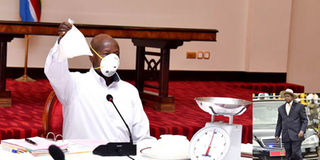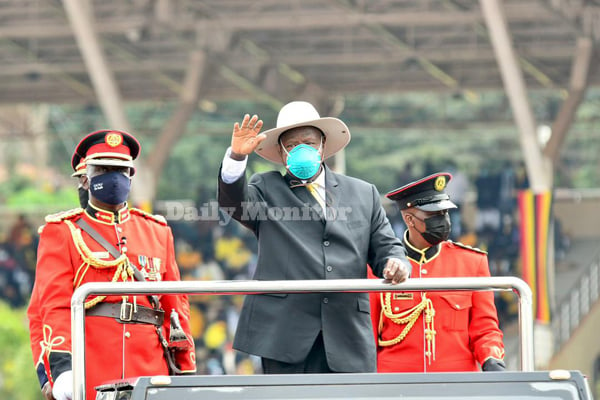Museveni: A politically divisive and socially loved president

In this file photo, President Museveni is seen demonstrating how families can survive by consuming measurable amounts of food during the Covid-19 pandemic while inset, he arrives for his latest inauguration at Kololo independence grounds on May 12.
What you need to know:
- The other side: To some the President has been a charismatic politician for more than 35 years and away from politics, he cuts a fatherly figure.
- So vintage: Over 35 years of leading Uganda, President Museveni has distinguished himself as a fatherly figure when it comes to social issues.
- He dispenses advice that even his worst critics cannot help but admire. At his vintage best, he is unmatched, writes Jacobs Odongo Seaman.
Put social issues on the table and President Yoweri Museveni will be as brittle as he will be tender. If saying his wife Janet only used prams for her children will rile a section of Ugandans, at least former Miss World Africa Quiin Abenakyo will agree with him on what constitutes African beauty.
In December 2018, Abenakyo arrived from China as Miss World Africa to a rousing welcome. And Museveni’s unusual tweet. Congratulating the model, the President urged her to ditch the weave she was wearing for an authentic African look. He said his wife Janet and daughters Diana, Patience and Natasha do not wear weaves.
“Abenakyo is indeed a tall, beautiful Musoga girl. My only concern is that she was wearing Indian hair. I have encouraged her to keep her natural African hair. We must show African beauty in its natural form,” he said.
Abenakyo heeded the advice. At a State dinner later, she turned up in her natural hair. The President hit the scores.
“Now, you have become African,” Museveni said.
“She has re-asserted her African identity in the form of keeping her hair natural because there is nothing to add on or subtract from the African beauty. God made it (African beauty) with nothing to add on. I congratulate her.”
In a way, Museveni often comes off as a traditionalist, yet in fleeting moments, the Stone Age outlook in him melts in the face of modernity.
In 2018, at the reading of the National Budget, the President walked into Kampala Serena Conference Centre holding Janet’s hand like a young couple in love. He is the master of chivalry – perhaps only second to former US President Barack Obama.
But moments after this lovey-dovey walk-in, Museveni said that he never asks bride price for his children unlike his father Amos Kaguta who practised it.
Chinua Achebe’s Okonkwo would have beaten his wives and daughters senselessly if they turned up from the market in wigs or weaves. Museveni would have agreed with Okonkwo on the stance, but he would call the Things Fall Apart character “cowardly and primitive.”
“Those who beat women are stupid and cowards, if you want to fight look for a fellow man and sort your issues. But beating a woman then you put on a trouser makes you less of a man. I personally do not count you as one,” Museveni once told congregants in a church.
“I have been with Janet for 49 years, but I have never even pushed her. If she annoys me, I walk away and go elsewhere. Why would you beat Adam’s daughter?”
However, if Okonkwo lived in reality today, he would have wasted no time in going to the bush with Museveni – at least to fight people who use their mouth for more than just eating.
In 2018, the President minced no words in a TV address, warning about the “wrong practices indulged in and promoted by some of the outsiders”.
“The mouth is for eating, not for sex. We know the address of sex; we know where sex is,” he said.
Signing the anti-gay bill into law in 2014, Museveni warned that oral sex could spread worms.
“You push the mouth there, you can come back with worms because that is the wrong address,” he said. “I have failed to understand that you can fail to be attracted to all these beautiful women and be attracted to a man. There is something really wrong with you.”
Dying for his wife
As Museveni sustains his stronghold over Uganda, his critics have grown manifold. He is accused of being intolerant, but many silently admit he is a moderate when critics insult him and get away with it.

First Lady, Janet Museveni. PHOTO/FILE
But not insulting his family. Former Makerere University researcher Stella Nyanzi called the President all sorts of names until she went after the First Lady.
Museveni said he would die if anyone disturbed his wife. Speaking during the Women’s Day celebrations in Mityana in 2018, he dived into his favourite pastime of drawing from the scriptures.
“You see what St Paul is telling us to do? If you disturb my wife, I can even die,” he said as he read from Ecclesiastes.
But Museveni dying can only work in the figurative sense or in the wishes of his ‘haters’. At 76, he looks the part and does not shy away from showing off.
Healthy lifestyle
In January last year, Museveni led bush war veterans in a 195km six-day trek, retracing routes used by National Resistance Army fighters during their liberation struggle.
He would later lecture citizens on exercising from home during Covid-19 lockdown, complete with a demo of his routines.
While he took the demo too far in showing how cash-strapped families could share ‘posho’ by using a weighing scale to measure the ration, his diet revelation was appealing.
“When we were in Ethiopia, President Obama commented that I looked young. I forgot to tell him that it’s because I eat Ugandan grown foods,” Museveni said.
“I am always fit but the doctors pointed out the mistakes and then I decided to shed off [weight]. I had not been watching my weight, which had gone up to 106kg.”
Museveni said he had come down to 76kg, a weight suitable for his 170cm height. The weight loss had left tongues wagging over the health of the septuagenarian leader.
“I eat some cassava, because I don’t eat your European and Asian foods. I eat our food; cassava, some bananas, millet and our vegetables,” he told BBC’s Alan Kasujja.
“So I normally eat a little bit of that in the morning. Then no lunch, I just drink water and coffee without sugar because it’s very bad - sugar is not good. Then at around seven [in the evening] I eat two Irish potatoes because they have got low starch, and a lot of vegetables to deceive the stomach that I am putting something there when in fact it’s just the roughage.”
Janet’s pram
Museveni’s explanation on transforming the lives of women in the rural areas would have struck the perfect notes, but then he drew in his wife.
“Janet here has never carried a baby on her back; the children were pushed in the prams. She’s not a horse to carry babies on her back,” Museveni said.
“She has never carried water on her head. She never cut or carried firewood on her head. She has never swept the house. This one has never gone out, that she is looking for the address [outside pit-latrine]. We are talking about social economic transformation.”
Many saw the example as detached from reality of the very people whose lives Museveni was advocating to transform.
And if she could not carry babies on her back or go to the outer address, would she be content with just being a First Lady? Certainly not and her decision to go into politics was no accident.
The political moments for Mama
Museveni found himself on the defensive as accusations of nepotism threatened to choke him.
“I have never sent any of those relatives to contest in those areas or anywhere; nor did they even consult me,” he wrote in 2020.
“I even opposed Mama Janet when she went to stand in Ruhama. It was only when a huge delegation of elders from Ruhama invaded me at Rwakitura, in support of her candidature that I relented.”
He told the BBC he had made her minister for Karamoja because no other members of his government wanted to work there.
“Maybe she can help me in this area where… the elite don’t want to go. Once I appwointed a minister and he said: ‘No, no, that [Karamoja]” is too backward, I don’t want to go there.”
Building the family
Critics might continue to have a field day but Museveni has shown over the years that nothing -- besides power -- matters to him more than his family.
On his 70th birthday celebration, Museveni paid tribute to Janet for building their family and raising the children
“When we got married, they were turbulent times, I didn’t look after the children, it was Janet. She was very strict, she did all the work and I am very grateful to her. The Banyankole say that when a man becomes of age he has to kwombeka (build a home). She built our home.
“Okwombeka now means getting an education, after get a wife, then children and after that wealth. Janet has helped me do all this,” he said.
So then, could it be that after Janet worked for the family, Museveni is paying back by working for them now? He has been unapologetic in reminding Ugandans that he is no servant of anyone.
“I’m working for my grandchildren, for my children,” he told Kenyan journalist Jeff Koinange in 2014.
“I am not an employee. I hear some people saying that I am their servant; I am not a servant of anybody. I am a freedom fighter; I am fighting for myself, for my belief. If anybody thinks you gave me a job, he is deceiving himself.”

President Museveni meets West Nile leaders in Nebbi. PHOTO/RACHEL MABALA
Quotes by the President
“Make sure you have families. Life without family is meaningless. I hear some people like it that way but this undermines the purpose of life. I get a lot of happiness and purpose from my family. It is eternity, you pass on the torch. It is a part of eternity to have children.”
“My young people, my children and grandchildren, what you need is to look after your health. Don’t squander it by taking alcohol, smoking and bumalaya (prostitution). If your health is good, you can do a lot of things. I don’t know what I would be if I did all that.”
“Janet here has never carried a baby on her back; the children were pushed in the prams. She’s not a horse to carry babies on her back,” Museveni said.





